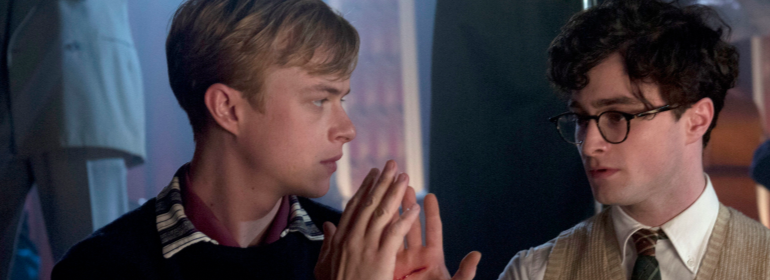We’ve been waiting for Daniel Radcliffe to play gay for what seems like an eternity, haven’t we? But does Kill Your Darlings deliver the goods? Simon Mernagh has the skinny.
And now for a little bit of trivia! There are two films by the name of Kill Your Darlings, though one is significantly less darling than the other. 2006’s Swedish version could be described as cinematically illiterate, for it was clearly brimming with interesting ideas but that weren’t expressed with any degree of sophistication. However, 2013’s version suffers no such problems. In fact, movies are rarely this eloquent.
Daniel Radcliffe plays the famous postmodern poet Allen Ginsberg, who amid a range of family problems gets accepted into Columbia University. He meets Lucien Carr (Dane DeHaan) in their boring Renaissance literature class and, together with fellow burgeoning writers Jack Kerouac (Jack Huston) and William Burroughs (Ben Foster), they revolt against established literary convention. What follows is a compendium of mother issues, beat poetry and an extremely assured feature-length directorial début for John Krokidas.
It’s hard to make movies about writing. Actually, scratch that. Portraying writers as interesting is the tough part, for their lonely craft is so inherently uncinematic. Recent flick The Fifth Estate added surreal dream sequences to alleviate Benedict Cumberbatch’s frantic typing, with middling success. But Kill Your Darlings adds gravitas to the hectic scribbling by not dwelling on it; this movie is about the writers themselves, rather than mere writing.
 What we get is a fairly intense multiple character study, anchored by Daniel Radcliffe’s performance. He completely shakes off the (invisibility) cloak forced upon him by the Harry Potter franchise, portraying a this young man in a passionate yet complex relationship Lucien Carr, which totally blurs the boundaries between sexual and a more Platonic kind of love.
What we get is a fairly intense multiple character study, anchored by Daniel Radcliffe’s performance. He completely shakes off the (invisibility) cloak forced upon him by the Harry Potter franchise, portraying a this young man in a passionate yet complex relationship Lucien Carr, which totally blurs the boundaries between sexual and a more Platonic kind of love.
DeHann’s performance as Carr is distinctly reminiscent of the younger, still-dangerous glory days of Leonardo DiCaprio. He’s got that same facial expression – that condescending smirk masking an inner vulnerability. Elsewhere, Foster does a good job avoiding the kind of cartoon depiction of Burroughs once seen in David Cronenberg’s Naked Lunch, while Huston is as charismatic as the real-life Kerouac is reported to have been. Arrested Development star David Cross deserves a shout-out for simply being in the film, although his lack of a moustache is a tad upsetting.
All that’s not to say Krokidas’ story is flawless. The movie truly captures the aesthetics of the time period – from the flashy suits to the classy jazz soundtrack, Kill Your Darlings nails the décor of the mid-40s. On the down side, it occasionally throws an anachronistic hip-hop song your way, Tarantino-style. While this can be a useful part of a director’s toolbox, here it feels jarring, and undermines the torrents of detail flowing through the film.
The movie also lacks a significant emotional punch, although sure as hell swings for one as Ginsberg and Carr both undergo sweeping character arcs, culminating in an intense dramatic scene that doesn’t quite deliver the intended poignancy.
But to focus on these negatives is a mistake. Perhaps best described as a literary ‘Muppet Babies’, Kill Your Darlings is a fascinating peek into the elusive architects of post-modernity.
© 2013 GCN (Gay Community News). All rights reserved.
